See also
- Guerra sucia (disambiguation) (Spanish for Dirty War)
- Category:Dirty wars
Dirty wars are offensives conducted by regimes against their dissidents, marked by the use of torture and forced disappearance of civilians.
Dirty War may also refer to:
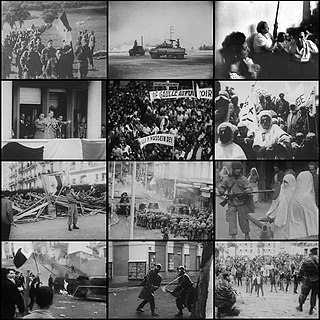
The Algerian War was a major armed conflict between France and the Algerian National Liberation Front (FLN) from 1954 to 1962, which led to Algeria winning its independence from France. An important decolonization war, it was a complex conflict characterized by guerrilla warfare and war crimes. The conflict also became a civil war between the different communities and within the communities. The war took place mainly on the territory of Algeria, with repercussions in metropolitan France.

The Dirty War is the name used by the military junta or civic-military dictatorship of Argentina for its period of state terrorism in Argentina from 1974 to 1983 as a part of Operation Condor. During this campaign, military and security forces and death squads in the form of the Argentine Anticommunist Alliance hunted down any political dissidents and anyone believed to be associated with socialism, left-wing Peronism, or the Montoneros movement.

The National Liberation Front commonly known by its French acronym FLN, is a nationalist political party in Algeria. It was the principal nationalist movement during the Algerian War and the sole legal and ruling political party of the Algerian state until other parties were legalised in 1989.
Irish republicanism is the political movement for an Irish republic, void of any British rule. Throughout its centuries of existence, it has encompassed various tactics and identities, simultaneously elective and militant and has been both widely supported and iconoclastic.
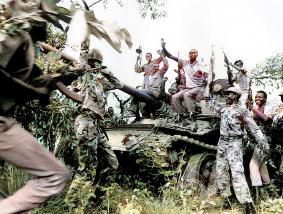
The Second Sudanese Civil War was a conflict from 1983 to 2005 between the central Sudanese government and the Sudan People's Liberation Army. It was largely a continuation of the First Sudanese Civil War of 1955 to 1972. Although it originated in southern Sudan, the civil war spread to the Nuba mountains and the Blue Nile. It lasted for almost 22 years and is one of the longest civil wars on record. The war resulted in the independence of South Sudan 6 years after the war ended.

The Algerian Civil War, known in Algeria as the Black Decade, was a civil war fought between the Algerian government and various Islamist rebel groups from 11 January 1992 to 8 February 2002. The war began slowly, as it initially appeared the government had successfully crushed the Islamist movement, but armed groups emerged to declare jihad and by 1994, violence had reached such a level that it appeared the government might not be able to withstand it. By 1996–97, it had become clear that the Islamist resistance had lost its popular support, although fighting continued for several years after.
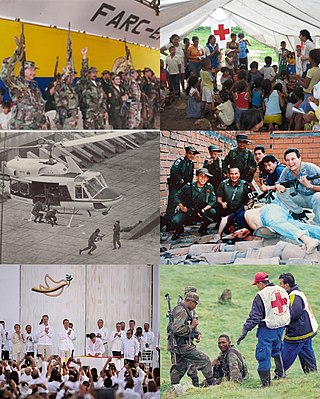
The Colombian conflict began on May 27, 1964, and is a low-intensity asymmetric war between the government of Colombia, far-right paramilitary groups and crime syndicates, and far-left guerrilla groups, fighting each other to increase their influence in Colombian territory. Some of the most important international contributors to the Colombian conflict include multinational corporations, the United States, Cuba, and the drug trafficking industry.
A pronunciamiento is a form of military rebellion or coup d'état particularly associated with Spain, Portugal and Hispanic America, especially in the 19th century.
Death flights are a form of extrajudicial killing in which the victims are dropped to their death from airplanes or helicopters into oceans, large rivers or even mountains. Death flights have been carried out in a number of internal conflicts, including by France during the 1947 Malagasy Uprising in Madagascar and the 1957 Battle of Algiers, and by the junta dictatorship during the Argentine Dirty War between 1976 and 1983. During the Bougainville conflict, PNGDF helicopters were used to dispose of corpses of detainees that had died under torture, and in some cases, still-living victims.

Jeremy Scahill is an American activist, author, and investigative journalist. He is a founding editor of the online news publication The Intercept and author of Blackwater: The Rise of the World's Most Powerful Mercenary Army (2007), which won the George Polk Book Award. His book Dirty Wars: The World Is a Battlefield (2013) was adapted into a documentary film which premiered at the Sundance Film Festival and was nominated for the 2014 Academy Award for Best Documentary Feature. In July 2024, he left The Intercept and, together with Ryan Grim and Nausicaa Renner, founded Drop Site News.
The Central American crisis began in the late 1970s, when major civil wars and communist revolutions erupted in various countries in Central America, causing it to become the world's most volatile region in terms of socioeconomic change. In particular, the United States feared that victories by communist forces would cause South America to become isolated from the United States if the governments of the Central American countries were overthrown and pro-Soviet communist governments were installed in their place. During these civil wars, the United States pursued its interests by supporting right-wing governments against left-wing guerrillas.
Aníbal Gordon was an Argentine suspected of being a leader of the Triple A death squad, active in 1973–1976 against leftist Peronistas during the period of rule by the Peróns. He served as an agent of the SIDE intelligence agency between 1968 and 1984. His activities extended into the period of the Dirty War against the political opposition, conducted by the juntas, which ruled from 1976 to 1983. He was also involved with the kidnappings of businessmen in the 1980s by the Puccio family gang.
White Terror may refer to:

Anti-communist mass killings are the politically motivated mass killings of communists, alleged communists, or their alleged supporters which were committed by anti-communists and political organizations or governments which opposed communism. The communist movement has faced opposition since it was founded and the opposition to it has often been organized and violent. Many anti-communist mass killing campaigns waged during the Cold War were supported and backed by the United States and its Western Bloc allies. Some U.S.-supported mass killings, including the Indonesian mass killings of 1965–66 and the killings by the Guatemalan military during the Guatemalan Civil War, are considered acts of genocide.
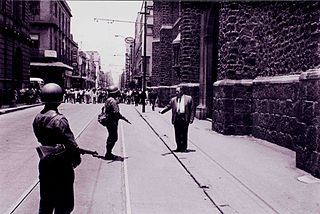
The Mexican Dirty War was the Mexican theater of the Cold War, an internal conflict from the 1960s to the 1980s between the Mexican Institutional Revolutionary Party (PRI)-ruled government under the presidencies of Gustavo Díaz Ordaz, Luis Echeverría, and José López Portillo, which were backed by the U.S. government, and left-wing student and guerrilla groups. During the war, government forces carried out disappearances, systematic torture, and "probable extrajudicial executions".
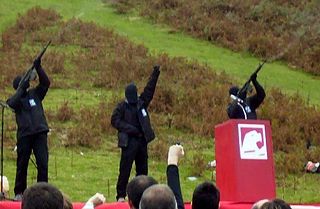
The Basque conflict, also known as the Spain–ETA conflict, was an armed and political conflict from 1959 to 2011 between Spain and the Basque National Liberation Movement, a group of social and political Basque organizations which sought independence from Spain and France. The movement was built around the separatist organization ETA, which had launched a campaign of attacks against Spanish administrations since 1959. ETA had been proscribed as a terrorist organization by the Spanish, British, French and American authorities at different moments. The conflict took place mostly on Spanish soil, although to a smaller degree it was also present in France, which was primarily used as a safe haven by ETA members. It was the longest running violent conflict in modern Western Europe. It has been sometimes referred to as "Europe's longest war".
Guerra sucia may refer to:

Dirty Wars is a 2013 American documentary film, which accompanies the book Dirty Wars: The World Is a Battlefield by Jeremy Scahill. The film is directed by Richard Rowley, and written by Scahill and David Riker.